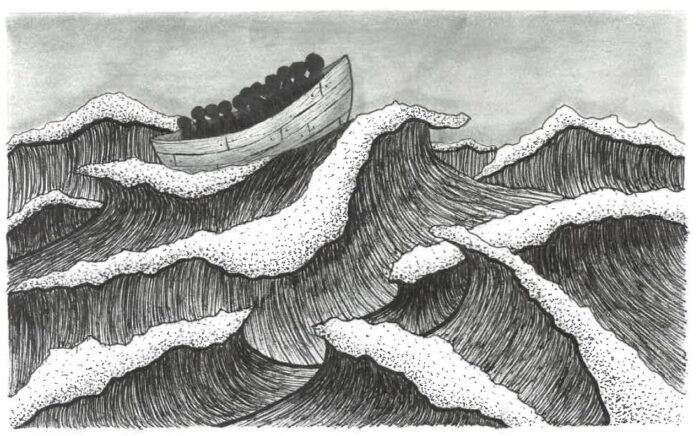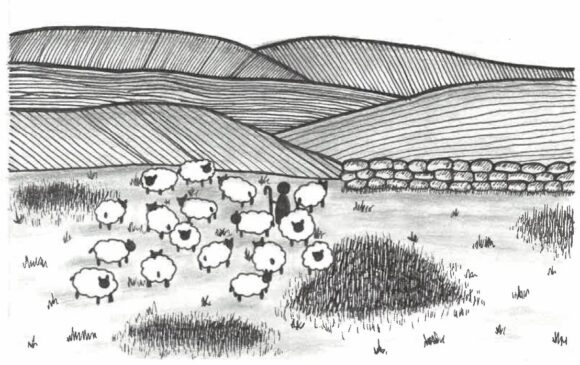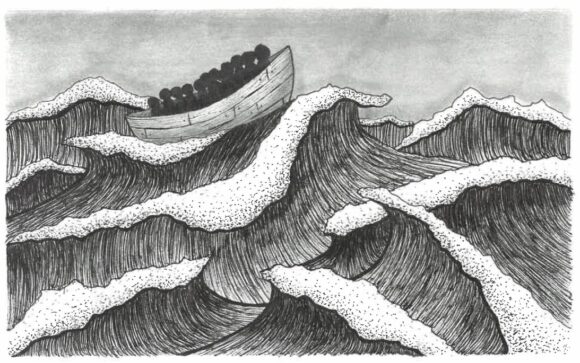DO YOU FIND IT HARD to relate to the Bible? After all it’s a book that was completed nearly 2,000 years ago, and it describes many events which most people these days would dismiss as impossible.
We have Sarah and Abraham in the book of Genesis who had their child at the ages of 90 and 100 (Genesis 21:5). We have strong- man Samson who killed a lion with his bare hands, 1,000 men with the jawbone of a donkey and then single-handedly demolished a temple (Judges 13–16). Then of course we have Jesus in the Gospels (Matthew, Mark, Luke and John) with his miracles of turning water into wine, healing and raising people from the dead.
Most people in the Bible though, even those who did amazing things, were very human. We will look in detail at two.
David
1. In 1 Samuel 16 the prophet Samuel is sent by God to the house of Jesse to declare which of Jesse’s sons will be the new king of Israel. Jesse brings his sons in and Samuel speaks to them all. However, God finds none of them suitable. ‘Then Samuel said to Jesse, “Are all your sons here?” And he said, “There remains yet the youngest, but behold, he is keeping the sheep.” And Samuel said to Jesse, “Send and get him, for we will not sit down till he comes here” (v. 11).
Have you ever felt left out because you are young, not as “educated” or as tall or good looking? Here David was overlooked by his own father when someone came to make a family member King!
2. God of course was not wrong, and David was made King over Israel. You can read of his adventures on his way to the throne in the remainder of 1 Samuel. He became a great and godly king, but he was not perfect, and he faced the same temptations we do. ‘It happened, late one afternoon, when David arose from his couch and was walking on the roof of the king’s house, that he saw from the roof a woman bathing… And one said, “Is not this Bathsheba, the daughter of Eliam, the wife of Uriah the Hittite?” So David sent messengers and took her, and she came to him, and he lay with her’ (2 Samuel 11:2–4).
To compound this sin, David had Bathsheba’s husband killed to try and cover it up (vs. 14–21). Adultery and murder! Have you ever done something so awful and shameful that you think you can never be forgiven? David repented, and God forgave him (for example Psalm 51).
3. David had many children. One of them, Solomon, took over from him as king and was known to be one of the wisest rulers the world has ever known (1 Kings 4:29). However David faced one of the greatest tragedies a father can when another of his sons, Absalom, turned against him and was killed in an insurrection. In 2 Samuel 18:33 we see David in despair: ‘O my son Absalom, my son, my son Absalom! Would that I had died instead of you, O Absalom, my son, my son!’
So David was seen as a nobody by his family in his youth; he took another man’s wife and had the man killed, and lost a son on the battlefield. Surely God really had no time for David? Wrong! In Acts 13 we read God’s assessment of David: ‘I have found in David the son of Jesse a man after my heart, who will do all my will. Of this man’s offspring God has brought to Israel a Saviour, Jesus, as he promised’ (vs. 22–23).
This man, who had difficulties and weaknesses and tragedies in his life just like us, was nevertheless a man who lived his faith, and he was therefore commended by God. He was a direct ancestor of God’s own Son Jesus Christ!
Peter
1. Peter’s faith wavered whilst performing a miracle. There was an occasion when Jesus walked to his disciples whilst they were on a boat in the middle of a stormy sea. Peter called out to Jesus, ‘”Lord, if it is you, command me to come to you on the water.” He said, “Come.” So Peter got out of the boat and walked on the water and came to Jesus. But when he saw the wind, he was afraid, and beginning to sink he cried out, “Lord, save me.” Jesus immediately reached out his hand and took hold of him, saying to him, “O you of little faith, why did you doubt?”’ (Matthew 14:28– 31).
So like any of us who might have faith in any given situation, Peter found his faith overcome almost immediately when given the opportunity to doubt.
2. After Jesus was condemned to death, Peter three times denied knowing him. He had boasted that although others might deny their master, he never would (Matthew 26:35). But when he was put to the test, his courage failed. The third time he was challenged ‘he began to invoke a curse on himself and to swear, “I do not know the man.” And immediately the cock crowed. And Peter remembered the saying of Jesus,
“Before the cock crows, you will deny me three times.” And he went out and wept bitterly’ (vs. 74–75).
So, like David, Peter had his faults. He lost faith on the stormy sea with Jesus right by him, and he denied even knowing Jesus three times when Jesus was arrested.
But for all his faults and weaknesses, when Peter recognised that Jesus was the Messiah Jesus said: ‘And I tell you, you are Peter, and on this rock I will build my church, and the gates of hell shall not prevail against it. I will give you the keys of the kingdom of heaven, and whatever you bind on earth shall be bound in heaven, and whatever you loose on earth shall be loosed in heaven’ (Matthew 16:18–19).
A Bible-Based Community
Ask any member of the Christadelphian community what makes them “different” from people of other faiths or no faith, and the answer will be universal. It is not the person who is different but their beliefs.
There are Christadelphians all over the world, and we come from a wide variety of walks of life, for example teachers, farmers, craftsmen, labourers, nurses, doctors, scientists, cooks, care workers, homemakers, retired and students. In order to be baptised and become a true member of the community you need to be old enough to understand that life- changing commitment (Mark 16:16), but the community also embraces the children of its members.
In a Christadelphian congregation there is no hierarchy and there are no paid positions. There are many tasks and roles, such as spiritual leadership, teaching children, preaching to others, caring for those in need and upkeep of premises.
The community is a body. As the Apostle Paul says, ‘As in one body we have many members, and the members do not all have the same function, so we, though many, are one body in Christ, and individually members one of another’ (Romans 12:4–5). As such, different members have different functions and different aptitudes. But they are all of equal value to each other and to God: ‘There is neither Jew nor Greek, there is neither slave nor free, there is no male and female, for you are all one in Christ Jesus’ (Galatians 3:28).
Christadelphians are distinctive because of our faith, which we believe is the same faith as was held by the First Century Christians, and the way we live which springs from our faith. But we’re not special—we are people like you.
Rich Lawson




